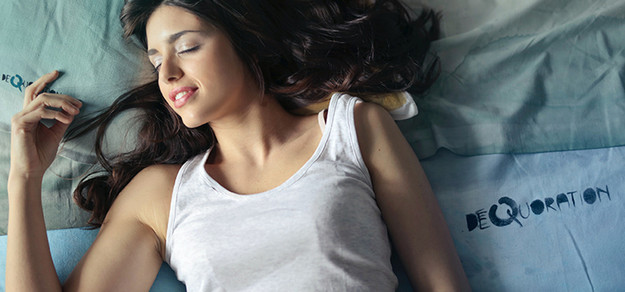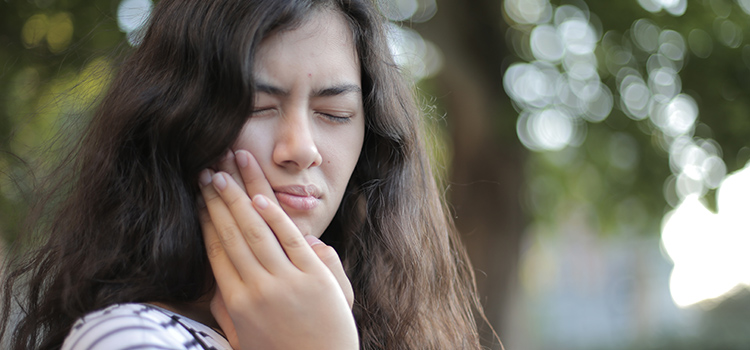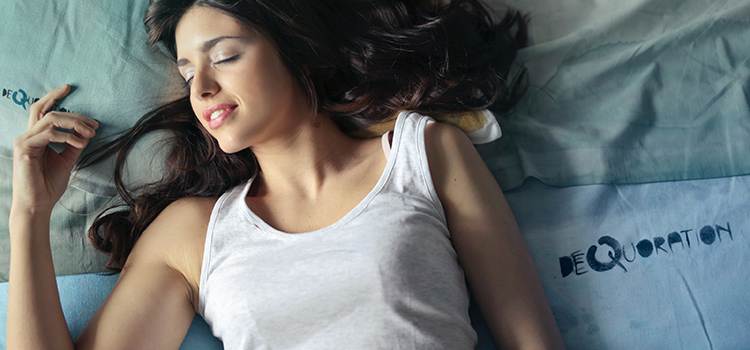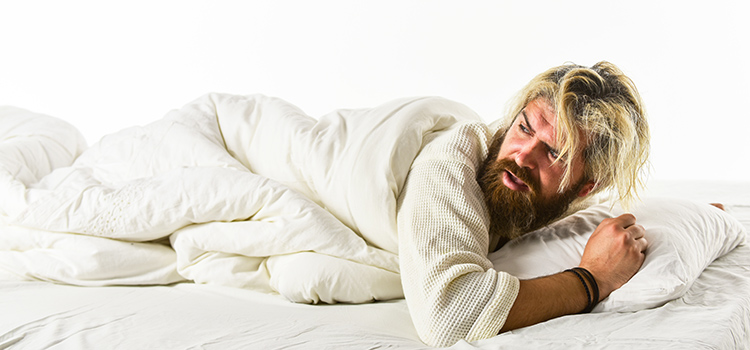TMJ And Sleeping Positions
16th Aug 2021

Temporomandibular joint disorder, known as TMJ or TMD, can cause extreme jaw pain, neck pain, and facial pain. In addition, teeth grinding and jaw clenching may also cause fatigue from lack of sleep. There is a relationship between TMJ and sleeping positions; while you’re sleeping you may unknowingly exacerbate your condition.
When you struggle with these oral health issues, certain sleeping positions may ease your pain and discomfort. On the other hand, some sleeping positions may worsen the painful side effects of TMJ disorder.

Why Sleeping Position Matters
TMJ pain is made worse by strain of the face, head, neck, and jaw. Some of the worst strain can come when you are sleeping because you are unaware of the clenching and grinding. When you alter your sleeping position, you might find that you experience less pain because you’re no longer subconsciously engaging in behaviors that exacerbate your TMJ pain.
In addition to helping relieve pain from TMJ disorder, the right sleeping position can give you a good night's sleep and improve your quality of life. When you aren’t getting enough sleep, you might even be more susceptible to pain, thus making your TMJ symptoms more painful (Frohnhofen 2018).
The Washington TMJ & Sleep Therapy Center explains that sleep position also influences how the head and neck are supported, which can increase or decrease the odds of jaw clenching and teeth grinding in the night. This is because different positions change the amount of force put on your head, neck, and jaw (Piontkowski 2015).
Related Articles:
- Can Wisdom Teeth Removal Cause Teeth Grinding?
- Can TMJ Caus Back Pain?
- How to Relieve Tooth Pain from Grinding

Best Sleeping Position for TMJ
Sleeping on your back is the best sleep position for TMJ and bruxism. Back sleeping is beneficial for a host of reasons:
- Helps avoid pressure on the jaw joint
- Provides support for the neck and shoulders
- Is ideal for spine alignment
- Reduces the chance of clenching and grinding
Teeth grinding can contribute to the symptoms of TMD because it puts added pressure on the jaw as well as the teeth. This forces the jaw muscles to become overworked and sore.
When you sleep on your back, refrain from propping your head up with your hands, as this can create misalignment of the spine. Additionally, you may want to speak to your healthcare provider if you have certain conditions, such as sleep apnea, snoring, or gastroesophageal reflux disease (GERD) before changing your sleep position. For conditions such as sleep apnea, the airway must remain open and back sleeping may not be the best position.
Worst Sleeping Positions for TMJ
According to a national sleep survey, 74% of Americans sleep on their sides. This is bad news if you have bruxism or TMJ. The worst sleeping positions for TMJ and bruxism are on your stomach and your side.
These positions do not support proper posture alignment. Depending on your position, your head or jaw may become misaligned. This misalignment can worsen TMJ symptoms. Sleeping on your side is particularly detrimental if you put your hand or arm under your head while you sleep.
A 2016 clinical trial found that stomach sleeping was associated with higher rates of TMJ when compared to a control group ( Yalçınkaya et al 2016).
For people who sleep on their side or stomach that have TMJ, adjusting to a new sleeping position would be beneficial. This can be one simple piece of your TMJ treatment plan that may vastly improve your symptoms. Other treatment options may include an oral appliance or TENS unit for TMJ (transcutaneous electrical nerve stimulation) therapy.
Related Articles:

Tips for Adjusting to Sleeping on Your Back
It’s not easy to adjust to a new sleeping position, particularly when you’ve been used to sleeping one way for many years. To help you be more comfortable sleeping on your back, get some supportive pillows. These will increase the support for your head and neck. Make sure you test out your pillow so it isn’t too flat or full. Ask a friend or family member to look at your body while you are lying on your pillow; your head should not be tilted up or down.
You might also find comfort from placing small pillows under your legs, knees, or the small of your back. Consider playing around with pillow placement as well as the position of your arms and legs.Try spreading your legs wide and placing your arms at your side or on your stomach.
If these adjustments do not help you switch sleeping positions, it may be time to purchase a new mattress. Consider looking for one that is specifically designed for back sleepers. Certain mattresses promote the best support and ensure there's no misalignment of the spine.
Adjusting Your Sleep Position for TMJ
For people who have temporomandibular joint disorder, the correct sleeping position may lessen painful symptoms. When you sleep on your back, you can relieve strain on your face, head, neck, and jaw. Adjusting to a new sleeping position may be difficult. Using supportive pillows and investing in a mattress designed for back sleepers may make the transition easier. After you make the switch to back sleeping, you may find that you wake up well-rested and pain-free!
References:
- Cision Writing Staff. (2012). National sleep survey pulls back the covers on how we doze and dream. Cision PR Newswire. https://www.prnewswire.com/news-releases/national-sleep-survey-pulls-back-the-covers-on-how-we-doze-and-dream-184798691.html
- Frohnhofen H. (2018). Pain and sleep : A bidirectional relationship. Schmerz und Schlaf : Eine bidirektionale Beziehung. Zeitschrift fur Gerontologie und Geriatrie, 51(8), 871–874. https://doi.org/10.1007/s00391-018-01461-8
- Piontkowski, D. (2015). The best sleeping position for tmj patients. The Washington TMJ & Sleep Therapy Center. http://www.dctmjsleep.com/the-washington-tmj-sleep-therapy-center-1/the-best-sleeping-position-for-tmj-patients
- Yalçınkaya, E., Cingi, C., Bayar Muluk, N., Ulusoy, S., & Hanci, D. (2016). Are temporomandibular disorders associated with habitual sleeping body posture or nasal septal deviation?. European archives of oto-rhino-laryngology : official journal of the European Federation of Oto-Rhino-Laryngological Societies (EUFOS) : affiliated with the German Society for Oto-Rhino-Laryngology - Head and Neck Surgery, 273(1), 177–181. https://doi.org/10.1007/s00405-014-3476-6

- Most Popular
- Hard Outside, Soft Inside
- 2MM Thick
- Moderate / Heavy

- Most Durable
- Hard Materials
- 1.5MM Thick
- Heavy / Severe

- For Day Time Use
- Thin, Barely Visible
- 1MM Thick
- Light / Moderate

- For Clenching
- Flexible & Soft
- 1.5MM Thick
- Light / Moderate

